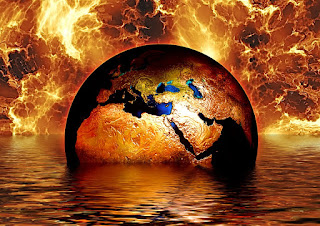Gardens Don't Lie: What Happens When Humans Encroach on the Ancestral Mother
Connecticut has been getting hammered with rain and intensely high humidity for nearly a month now. We've basically been existing in a swamp since early July. I don't remember a summer nearly as soggy as this one.
Vegetable gardens don't like this at all. Cucumber vines turn brown and rot, and tomatoes go soft before ripening or burst from waterlogging. Greens beds get pulpy and pick up fungus.
I'm not going to say this has devastated the 2018 growing season, but it's diminished it greatly. Nonetheless, I was able to bring family a big bag of fresh vegetables yesterday, but harvesting it for my loved ones pretty much left our cucumber vines empty. There's still lots of tomatoes, but unless it dries out soon, they won't make it to fruition. We may have to pull them while they're green and ripen them on windowsills, which doesn't make for optimal tomatoes. Tomatoes are tastiest and most nutritious when ripened on parent plants.
Green bean plants are also browning from lack of sun and outrageous amounts of rain. Ditto our squash plants. And if all this isn't enough to make us despair, last week, hungry black bears came in overnight and wiped out our corn crop. The ground was covered with husked and eaten corn. They had a magnificent feast while we were sleeping.
As veganic gardeners, we don't apply pesticides, herbicides, or fungicides, so we take the loss, and try to take it with grace and acceptance. The gardens are not ours, the Earth is not ours. Global weather patterns of recent years are exhibiting the effects of human encroachment on Gaia, our ancestral mother. This has been a killer summer everywhere in the world, with temperatures, seal levels, and weather patterns that have been shredding records.
Each time a global warning naysayer opens his or her mouth to refute the credible body of evidence that human activity is largely contributing to the increase in CO2 levels that's changing our world for the worse, I want to howl. Catastrophic climate change is happening: anyone who denies that now is grappling with psychopathy.
Part of this evidence of change is found in food gardens everywhere: we're having a harder and harder time growing our own food. That's good news for Monsanto and its corporate ilk, and terrifying news for the rest of us.
My husband and I have produced enough garden food this summer to feed ourselves and our family. But this season, there has been no surplus for our local food bank, and little for friends. This fractures a connection we've always had with our community. It's a lesser-known consequence of the changes in our climate that are affecting our ability to feed those other than ourselves.
One of the best parts of home-based food production is giving food to others. For me, it's the look on someone's face when I hand them a big bag of sun-ripened garden tomatoes or other garden gift. Free, pure, nutritious food! Good feels all around. The ultimate win-win.
Today is August 5. It's sunny this morning, but rain is in the forecast for the afternoon and evening. I hope this little spate of sun rejuvenates our gardens a bit. Summer is winding down, and soon, the long winter will be upon us.
As far as climate change is concerned, there is no doubt we are now in a race for survival. We're way past the point of incremental action. Stronger commitments to change have to happen now. Even our food gardens are drawing us a picture. And our gardens have never been in the business of lying to us.
Barbie xo


